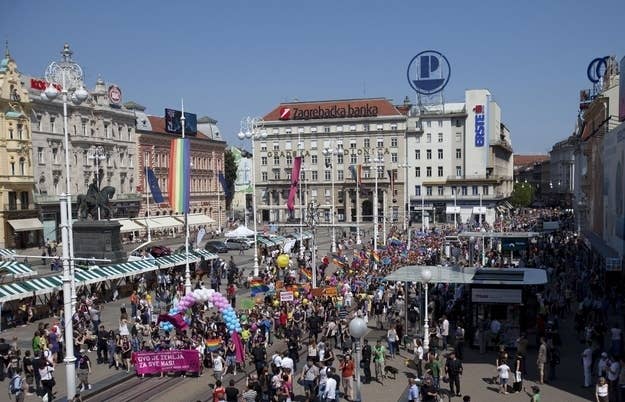
Croatia will hold a referendum on Dec. 1 to consider changes to the country's constitution that would ban same-sex marriage, a parliamentary commission decided on Wednesday.
The commission voted 10-3 to hold a referendum on whether to constitutionally define marriage as being between a man and a woman. Croatia currently has minimal partnership protections in the form of "cohabitation agreements."
The decision comes at an awkward moment for the Balkan country. Croatia officially joined the European Union on July 1, and its LGBTI rights record came under close scrutiny in the lead-up. It was required to adopt a law banning discrimination on the basis of sexual orientation as a condition of EU membership.
News of the vote broke as Croatia was in the midst of hosting a meeting of the International Gay and Lesbian Association's (ILGA) European branch in its capital, Zagreb, gathering 290 LGBTI activists from 40 countries. Top human rights officials from the U.S. and EU also came to lend their support to the conference — though all declined to comment on the proposed marriage amendment, reflecting that even as marriage has become a central plank of an LGBTI rights agenda in their domestic constituencies, it still remains taboo when it comes to international diplomacy.
LGBT rights are "a key foreign policy priority for the Obama administration and Secretary Kerry, and we're very proud to be supporting human rights for LGBT persons," Acting U.S. Assistant Secretary of State Uzra Zeya, who heads the Bureau of Democracy, Human Rights, and Labor, told Croatian television cameras on her way into the meeting. But she demurred on a question from a local reporter about the ballot measure.
"As a matter of policy, the U.S. government does not advocate for or against same-sex marriage in other countries," Zeya said, explaining that the U.S. is focused on countering criminalization of "LGBT status," combating hate crimes, and "other core issues."
Aurel Ciobanu-Dordea, the director for equality in the European Commission's justice ministry, also declined to comment on the proposal during a panel discussion, saying that the EU was not empowered by its members to take positions on family law. Stavros Lambrinidis, the EU's special representative concerning human rights issues in non-member nations, declined to comment on the measure because human rights questions inside the EU are not in his jurisdiction.
Croatia's foreign minister Vesna Pusić, who is also deputy prime minister in the government of Prime Minister Zoran Milanović, signaled her displeasure with the ballot measure when she addressed the conference.
"We have a lot of uphill struggles ahead of us, one pretty close ahead of us," she said. To show how fast Croatia is changing, she cited the fact that a pride march held annually in the costal city of Split now goes off peacefully, whereas it provoked violence when first held three years ago. "Every discrimination, every attempt to stigmatize or exclude anybody, is a human rights issue," Pusić said.
The terms of the popular referendum, decided on Wednesday, appear serpentine. If the initiative to ban same-sex marriage, sponsored by an organization called U Ime Obitelji (In the Name of the Family), passes, the constitution will not be immediately amended to define marriage as a union between a man and a woman. Instead, parliament will hold its own vote on whether or not to adopt the marriage amendment, the commission decided on Wednesday. In theory, the Croatian people could vote to ban same-sex marriage and the parliament could then veto their decision.
This caught local LGBTI activists off guard. Sanja Juras, coordinator of the Lesbian Group Kontra and one of the local hosts of the ILGA-Europe conference, told BuzzFeed that her organization was still discussing with its lawyers how best to respond. Before the vote, Juras had said that if it were put to the ballot the organization would go to court since it believes that human rights questions should not be put to a popular vote.
Juras also said she was surprised that the government allowed the referendum to move forward in the first place. Until days before the vote, her organization thought commission members would block it, and was not sure what changed.
"I believe that the government should have banned [the initiative] by taking a clear stand that this is a human rights issue and human rights shouldn't be taken to referendum," she said.
But Pusić, the foreign minister, said that was not an option — In the Name of the Family had gathered the signatures to put the move to the voters, and there was very little the government could do to avoid a vote.
"I actually think it's the kind of issue that shouldn't be voted on in the referendum, especially minority rights because by definition ... they could be easily endangered by a referendum [passed by] the majority," she said. "However, unfortunately, this is at the moment how our constitution stands and we are debating this issue how to prevent this in the future."
